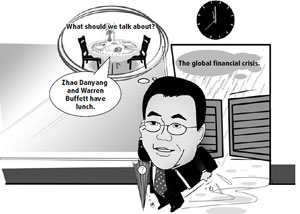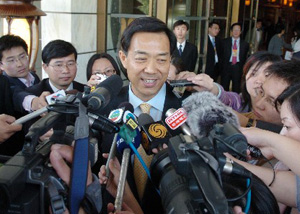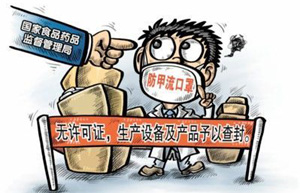2009 top ten news
Top 10 initiatives in local govts
By Michelle Du (chinadaily.com.cn)
Updated: 2010-01-14 06:10
 |
Large Medium Small |
Editor's Note: From free medical services to new residence policies, from official blogging to assets disclosure, many local governments implemented new policies and regulations that aim to better serve public interests. As a Chinese saying goes: "Test the stone in the river before taking each step in it." The new steps these local governments took last year might help bring in more progress into the public service.
Here are the 10 most impressive public service initiatives local governments adopted in 2009, as selected by Xinhuanet.com. [The Top 10 Everything of 2009]
1. Assets declarations for officials in Altay
2. Free medical services for citizens in Shenmu
3. No 'single' official in top positions in Shenzhen
4. Sichuan intensifies inspection on cadre appointment
5. Shanghai reforms 'hukou' policy
6. Hangzhou puts official vehicles up for auction
7. Jiangxi officials blog about daily work
8. Departments of Kunming set time limit for public response
9. Suining officials urged to be brief in speech
10. Hebei officials look for lapses in 'green' initiatives
1. Assets declarations for officials in Altay
|
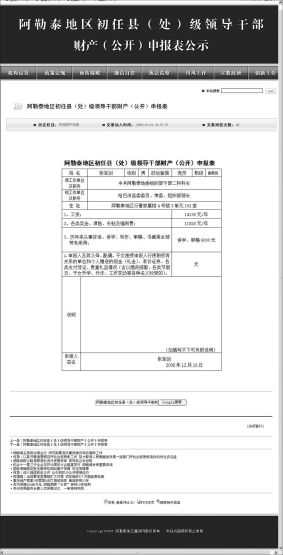 A computer screen grab shows income details of a county official made public on the Internet. [Photo/Xinhuanet.com] |
The income details of 55 officials in Altay prefecture in northern Xinjiang Uygur autonomous region were made public on the first day of 2009. The prefecture's disciplinary department later required all 1,000 county-level and division-level officials in the region to declare their assets once a year.
The declaration is divided into two parts. The first includes officials' annual salaries, subsidies and other income from activities such as giving lectures and publishing books.
The second part, which will be restricted from public scrutiny, includes officials' income from the stock market, inheritance and lotteries, as well as any fixed assets of more than 100,000 yuan. Officials are also required to report monetary gifts or those given to their parents, spouses and children.
Inspectors in three other cities -- Xiangxiang in Hunan province, Cixi in Zhejiang province and Liuyang in Hunan province -- also implemented a pilot program that required public officials to post information about their finances, officials said.
Related readings:
 Xinjiang prefecture to publicize officials' pay
Xinjiang prefecture to publicize officials' pay
 Officials report no extra pay
Officials report no extra pay
 Pilot project to improve transparency declared a success
Pilot project to improve transparency declared a success
 Property declaration: pros & cons
Property declaration: pros & cons
2. Free medical services for citizens in Shenmu
|
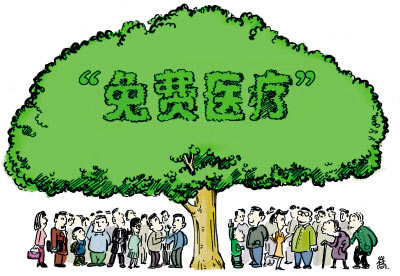 "Free medical services" [Photo/Xinhuanet.com] |
The government of Shenmu, a county in Shaanxi province, launched a free medical service program for all 390,000 citizens. Rural and urban residents alike in the county can have their medical expenses reimbursed if they spend more than 200 yuan in township clinics, 400 yuan in county-level hospitals and 3,000 yuan in hospitals outside the county.
Under the new policy, which took effect in March, inpatients can get 90 percent of their medical expenses refunded, and outpatients can get an annual maximum refund of 60,000 yuan, said the county's top official, Guo Baocheng.
Related readings:
 Coal-rich county offers free medical care for all
Coal-rich county offers free medical care for all
 Sensible healthcare
Sensible healthcare
3. No 'single' official in top positions in Shenzhen
|
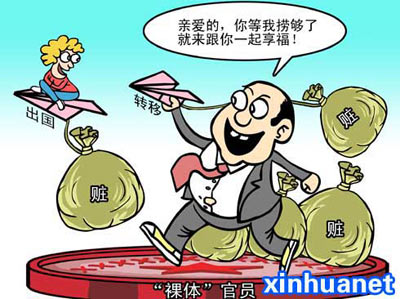 'Single' official: "Dear, wait for me there (abroad) and I'll join you for comforts after I've gained enough."(words in the circle) [Photo/Xinhuanet.com] |
Top officials in Shenzhen, Guangdong, had to keep their spouses and families in China if they want to keep their jobs following a new regulation in November.
The new regulation stipulates that officials whose spouse and children have all emigrated to foreign countries should not take top positions in the Party and government. With 20 specific requirements for local top officials, it's the first substantive enactment that restricts local officials' powers and sets clear boundaries.
The initiative to improve supervision of top officials also suggests that district-level and city-level heads have no right to assign rights to land.
Related readings:
 Shenzhen officials face tight scrutiny to fight corruption
Shenzhen officials face tight scrutiny to fight corruption
4. Sichuan intensifies inspection on cadre appointment
|
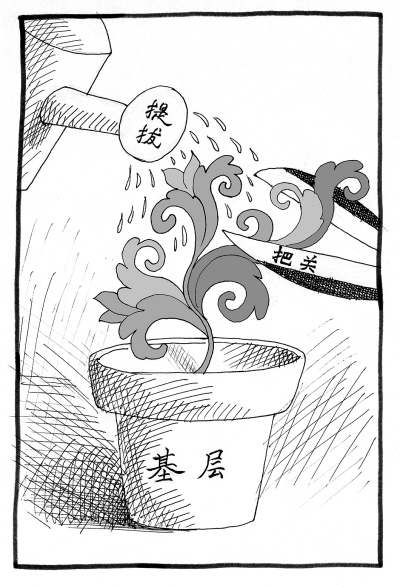 Promotions (the watering pot in the picture) should be screened (the scissors). [Photo/Xinhuanet.com] |
The Sichuan provincial Party committee in September issued a new rule on the inspection of officials leaving posts. The initiative is said to address the problems of violating rules on personnel recruitment and official promotions.
According to the initiative, officials who have been removed from positions in the Party or government and who have received even harsher penalty, should be scrutinized over the process of promotion. Once any violations of rules are found, related persons should be held accountable.
The province holds regular surveys of the public and government departments on government personnel recruitment. Through stricter rules on inspections of choice and appointments of cadres, the province attempted to improve public confidence in the recruitment of government personnel.
5. Shanghai reforms 'hukou' policy
|
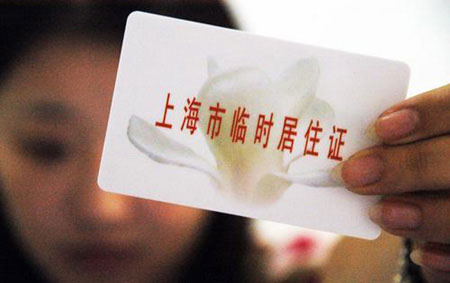 A woman holds a temporary residence permit in Shanghai. [Photo/Photocome.com] |
Shanghai municipal government officials adopted a new regulation in February that stipulates people who have lived for seven years cumulatively in Shanghai could have a chance to get permanent residence.
Applicants for resident status should also have participated in the social security system for seven years and paid taxes in Shanghai. Other conditions include holding middle-level professional certificates and abiding by the country's "one-child" policy.
At present, Shanghai has a population of 19 million, and more than 6 million are without a permanent residence.
Related readings:
 Shanghai offers permanent residence conditionally
Shanghai offers permanent residence conditionally
 Shanghai turning its back on poor
Shanghai turning its back on poor
6. Hangzhou puts official vehicles up for auction
|
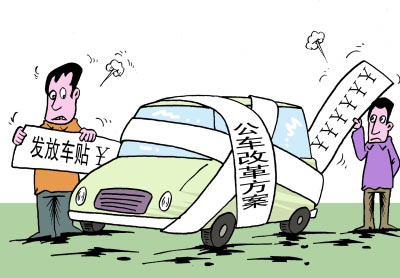 Reform on official vehicles. [Photo/Xinhuanet.com] |
The government of Hangzhou, the capital city of East China's Zhejiang province, in May started to put the vehicles designated for officials at and below the level of bureau director up for auction. The initiative made some cadres turn to a more environmentally friendly way of transportation.
Having a chauffeur was once a sign of social status for cadres, while many official vehicles are in fact always used for non-official purposes.
The city estimated a 59 million yuan reduction in expenses from the official vehicles every year, about 50 percent of the total budget for all official vehicles.
7. Jiangxi officials blog about daily work
|
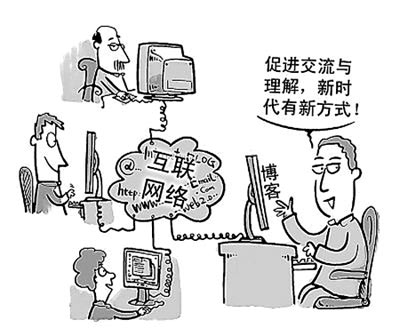 Blogging craze: It's a new channel for better communication and understanding in a new era. (words up right) [Photo/Xinhuanet.com] |
More than 60 county-level officials in Jiangxi province opened their blogs at jixwmw.cn last year. All of them use their real names for their blogs, and the content included their photos, daily work schedules and interaction with local residents. Some even sought suggestions from blog visitors on issues concerning social and economic development.
The number of posts at the site reached several hundred, with hundreds of thousands of site visits and more than 5,000 comments. Blogging by local officials will improve their connections with their constituents, some blog readers said.
8. Departments of Kunming set time limit for public response
|
 A computer screen grab shows the frontpage of the Information Office of Yunnan provincial government at t.sina.com.cn. [Photo/Xinhuanet.com] |
The city government of Kunming, the capital city of Southwest China's Yunnan province, asked its departments and related institutions to respond to problems efficiently and issued a new regulation in July.
It says that related departments in Kunming should be held accountable for certain issues on which the media exposed problems, if those departments had not responded to a notice of supervision from the city's Party discipline inspection committee within 10 days.
9. Suining officials urged to be brief in speech
|
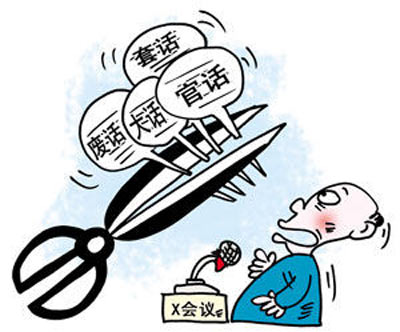 Rid of all unnecessary language and stop talking big.[Photo/Xinhuanet.com] |
A reform of language and behavior in departments of the Suining county government was written into a new regulation, including details on how many minutes an official could take for a speech during meetings.
The government of Suining, in East China's Jiangsu province, banned clichés and unnecessary language in speeches and issued standards on effective speaking during meetings and efficient ways of working.
10. Hebei officials look for lapses in 'green' initiatives
|
 [Photo/Xinhuanet.com] |
A report on the evaluation of energy-saving and emission reduction results in 30 counties and 30 enterprises in Hebei province was made public in June and showed differences from reports of previous years.
Besides certain information of disqualified localities, relevant persons responsible for those problems were also publicized. Related departments were asked to analyze and review certain issues, report to the provincial government, and establish measures within a month to rectify the problems.
The provincial government also intensified direct supervision of energy saving and emissions reduction projects. Authorities said county-level officials should resign, executives of state-owned enterprises dismissed and private enterprises face suspension of operations unless they meet specified energy-saving and emissions reduction standards.


